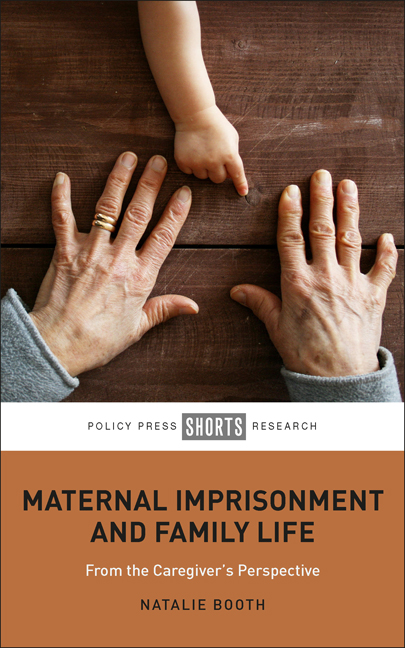Book contents
- Frontmatter
- Contents
- List of Tables
- Acknowledgements
- Preface: Linda’s Story
- One The Landscape of Maternal Imprisonment: Caregiving and Family Life
- Two Researching the Caregiver’S Lived Experiences
- Three Family Constructions and Caregiving Practices
- Four Renegotiating Family Life: Caregiving in the Aftermath of the Mother’S Imprisonment
- Five Navigating the Criminal Justice System
- Six Social Support, Familial Stigma and Release
- Seven Kin Caregiving: Occupying a Disenfranchised Status While Serving the Family Sentence
- Eight Reflections on the Research Process
- References
- Index
Six - Social Support, Familial Stigma and Release
Published online by Cambridge University Press: 10 March 2021
- Frontmatter
- Contents
- List of Tables
- Acknowledgements
- Preface: Linda’s Story
- One The Landscape of Maternal Imprisonment: Caregiving and Family Life
- Two Researching the Caregiver’S Lived Experiences
- Three Family Constructions and Caregiving Practices
- Four Renegotiating Family Life: Caregiving in the Aftermath of the Mother’S Imprisonment
- Five Navigating the Criminal Justice System
- Six Social Support, Familial Stigma and Release
- Seven Kin Caregiving: Occupying a Disenfranchised Status While Serving the Family Sentence
- Eight Reflections on the Research Process
- References
- Index
Summary
Introduction
This is the final chapter presenting empirical findings from the study and it intends to contextualise the caregivers’ experiences by focusing on their status and position in the wider society. It examines interactions with individuals and agencies external to the caregivers’ own social and family networks. Research has shown that families (Condry, 2007a) and children (Minson, 2018a) experience stigma through their association with a prisoner; relatedly, the narratives of the caregiving kin bring sharply into focus the lived realities of the discrimination and isolation that accompanied their experience of maternal imprisonment. Anxieties about social acceptance, legal guardianship and gaining appropriate support underpinned the caregivers’ accounts while they negotiated the prison sentence and looked to the mother's future return to the family. This chapter has three main sections, exploring:
Challenges facing primary kin caregiver's without legal guardianship for the children, and their experiences of identifying and securing statutory support.
Caregivers’ experiences, perceptions and management of familial stigma in media reports, their local community, online and at the prison.
Caregivers’ expectations of the mother's release. This section explores how relatives were approaching the mother's release in light of the uncertainties and anxieties that they were feeling about further readjustments.
Legal guardianship and statutory support
Primary kin caregivers in around half of the families interviewed had legal guardianship for the children. Two were biological fathers with parental responsibility (Pita and Daniel), while primary kin caregivers in five additional families had been formally assigned responsibility for the children by social services (see Chapter Two). In the latter instance, they had been looking after the children before the mother came into contact with the criminal justice system (for example, Annette) or after her arrest (for example, Miriam). For these primary kin caregivers, their position as legal guardians of the children was secure and so although the mother's imprisonment impacted their lives in several ways (as seen in Chapter Three, Four and Five), it did not affect their legal caregiving status. However, for the primary kin caregivers in the remaining eight families, a central concern that underscored their accounts was awareness of their informal caregiving status.
- Type
- Chapter
- Information
- Maternal Imprisonment and Family LifeFrom the Caregiver's Perspective, pp. 127 - 156Publisher: Bristol University PressPrint publication year: 2020



